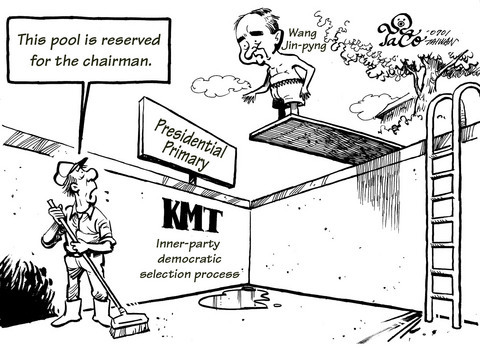The issue of Taiwanese independence has become one of world interest. However, the manner in which the story has been developing gives the
impression that it will not be possible to resolve the issue in a way that is acceptable to Taiwan and China.
On the one hand, you have an island where people have developed their own culture, government and technology and the people would like to maintain this and be recognized for these successes and developments as an independent nation. On the other hand, this island -- with historical ties to Japan and the US -- has technologies Beijing would like to get its hands on to further its objectives. Taiwan's strategic alliance with Japan and the US is showing big on the radar screens in Beijing.

An acceptable compromise would perhaps involve recognition of Taiwan as an independent nation in return for a Taiwanese military and technological alliance with China. Just as the US operates with its allies, China and Taiwan would operate joint military bases and synchronize their efforts to ensure security at home.
The benefits to Taiwan would be the following:
* It turns a potentially aggressive neighbor into a protector who can respond quickly.
* It gains access to China's defense manufacturing facilities, allowing Taiwan to develop its own defense technology rather than sending contentiously large amounts of money to foreign powers for the purchase of old technology.
* Taiwan gains universal recognition as an independent nation.
The benefits to China would be:
* One of its neighbors becomes a strong ally.
* It gains access to new technology.
* It expands its world influence, raises its trustworthiness and gains recognition for the the mature way in which it resolved a contentious issue.
If this is successful, other countries might also form alliances with Taiwan and China, thus forming a snowball effect o in securing East Asia.
This is just a seed of an idea, but with proper refinement it could perhaps serve as a basis for improved Taipei-Beijing relations.
John Stewien
South Australia
In their recent op-ed “Trump Should Rein In Taiwan” in Foreign Policy magazine, Christopher Chivvis and Stephen Wertheim argued that the US should pressure President William Lai (賴清德) to “tone it down” to de-escalate tensions in the Taiwan Strait — as if Taiwan’s words are more of a threat to peace than Beijing’s actions. It is an old argument dressed up in new concern: that Washington must rein in Taipei to avoid war. However, this narrative gets it backward. Taiwan is not the problem; China is. Calls for a so-called “grand bargain” with Beijing — where the US pressures Taiwan into concessions
The term “assassin’s mace” originates from Chinese folklore, describing a concealed weapon used by a weaker hero to defeat a stronger adversary with an unexpected strike. In more general military parlance, the concept refers to an asymmetric capability that targets a critical vulnerability of an adversary. China has found its modern equivalent of the assassin’s mace with its high-altitude electromagnetic pulse (HEMP) weapons, which are nuclear warheads detonated at a high altitude, emitting intense electromagnetic radiation capable of disabling and destroying electronics. An assassin’s mace weapon possesses two essential characteristics: strategic surprise and the ability to neutralize a core dependency.
Chinese President and Chinese Communist Party (CCP) Chairman Xi Jinping (習近平) said in a politburo speech late last month that his party must protect the “bottom line” to prevent systemic threats. The tone of his address was grave, revealing deep anxieties about China’s current state of affairs. Essentially, what he worries most about is systemic threats to China’s normal development as a country. The US-China trade war has turned white hot: China’s export orders have plummeted, Chinese firms and enterprises are shutting up shop, and local debt risks are mounting daily, causing China’s economy to flag externally and hemorrhage internally. China’s
During the “426 rally” organized by the Chinese Nationalist Party (KMT) and the Taiwan People’s Party under the slogan “fight green communism, resist dictatorship,” leaders from the two opposition parties framed it as a battle against an allegedly authoritarian administration led by President William Lai (賴清德). While criticism of the government can be a healthy expression of a vibrant, pluralistic society, and protests are quite common in Taiwan, the discourse of the 426 rally nonetheless betrayed troubling signs of collective amnesia. Specifically, the KMT, which imposed 38 years of martial law in Taiwan from 1949 to 1987, has never fully faced its